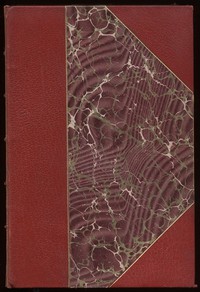Guy Mannering; or, The Astrologer — Complete by Walter Scott (good books to read in english .TXT) 📗

- Author: Walter Scott
Book online «Guy Mannering; or, The Astrologer — Complete by Walter Scott (good books to read in english .TXT) 📗». Author Walter Scott
In about a minute a stout labourer was patting Dumple, and introducing him into the stable, while Mrs. Dinmont, a well-favoured buxom dame, welcomed her husband with unfeigned rapture. ‘Eh, sirs! gudeman, ye hae been a weary while away!’
The present store-farmers of the south of Scotland are a much more refined race than their fathers, and the manners I am now to describe have either altogether disappeared or are greatly modified. Without losing the rural simplicity of manners, they now cultivate arts unknown to the former generation, not only in the progressive improvement of their possessions but in all the comforts of life. Their houses are more commodious, their habits of life regulated so as better to keep pace with those of the civilised world, and the best of luxuries, the luxury of knowledge, has gained much ground among their hills during the last thirty years. Deep drinking, formerly their greatest failing, is now fast losing ground; and, while the frankness of their extensive hospitality continues the same, it is, generally speaking, refined in its character and restrained in its excesses.
‘Deil’s in the wife,’ said Dandie Dinmont, shaking off his spouse’s embrace, but gently and with a look of great affection; ‘deil’s in ye, Ailie; d’ye no see the stranger gentleman?’
Ailie turned to make her apology--’Troth, I was sae weel pleased to see the gudeman, that--but, gude gracious! what’s the matter wi’ ye baith?’ for they were now in her little parlour, and the candle showed the streaks of blood which Dinmont’s wounded head had plentifully imparted to the clothes of his companion as well as to his own. ‘Ye’ve been fighting again, Dandie, wi’ some o’ the Bewcastle horse-coupers! Wow, man, a married man, wi’ a bonny family like yours, should ken better what a father’s life’s worth in the warld’; the tears stood in the good woman’s eyes as she spoke.
‘Whisht! whisht! gudewife,’ said her husband, with a smack that had much more affection than ceremony in it; ‘never mind, never mind; there’s a gentleman that will tell you that, just when I had ga’en up to Lourie Lowther’s, and had bidden the drinking of twa cheerers, and gotten just in again upon the moss, and was whigging cannily awa hame, twa landloupers jumpit out of a peat-hag on me or I was thinking, and got me down, and knevelled me sair aneuch, or I could gar my whip walk about their lugs; and troth, gudewife, if this honest gentleman hadna come up, I would have gotten mair licks than I like, and lost mair siller than I could weel spare; so ye maun be thankful to him for it, under God.’ With that he drew from his side-pocket a large greasy leather pocket-book, and bade the gudewife lock it up in her kist.
‘God bless the gentleman, and e’en God bless him wi’ a’ my heart; but what can we do for him, but to gie him the meat and quarters we wadna refuse to the poorest body on earth--unless (her eye directed to the pocketbook, but with a feeling of natural propriety which made the inference the most delicate possible), unless there was ony other way--’ Brown saw, and estimated at its due rate, the mixture of simplicity and grateful generosity which took the downright way of expressing itself, yet qualified with so much delicacy; he was aware his own appearance, plain at best, and now torn and spattered with blood, made him an object of pity at least, and perhaps of charity. He hastened to say his name was Brown, a captain in the----regiment of cavalry, travelling for pleasure, and on foot, both from motives of independence and economy; and he begged his kind landlady would look at her husband’s wounds, the state of which he had refused to permit him to examine. Mrs. Dinmont was used to her husband’s broken heads more than to the presence of a captain of dragoons. She therefore glanced at a table-cloth not quite clean, and conned over her proposed supper a minute or two, before, patting her husband on the shoulder, she bade him sit down for ‘a hard-headed loon, that was aye bringing himsell and other folk into collie-shangies.’
When Dandie Dinmont, after executing two or three caprioles, and cutting the Highland fling, by way of ridicule of his wife’s anxiety, at last deigned to sit down and commit his round, black, shaggy bullet of a head to her inspection, Brown thought he had seen the regimental surgeon look grave upon a more trifling case. The gudewife, however, showed some knowledge of chirurgery; she cut away with her scissors the gory locks whose stiffened and coagulated clusters interfered with her operations, and clapped on the wound some lint besmeared with a vulnerary salve, esteemed sovereign by the whole dale (which afforded upon fair nights considerable experience of such cases); she then fixed her plaster with a bandage, and, spite of her patient’s resistance, pulled over all a night-cap, to keep everything in its right place. Some contusions on the brow and shoulders she fomented with brandy, which the patient did not permit till the medicine had paid a heavy toll to his mouth. Mrs. Dinmont then simply, but kindly, offered her assistance to Brown.
He assured her he had no occasion for anything but the accommodation of a basin and towel.
‘And that’s what I should have thought of sooner,’ she said; ‘and I did think o’t, but I durst na open the door, for there’s a’ the bairns, poor things, sae keen to see their father.’
This explained a great drumming and whining at the door of the little parlour, which had somewhat surprised Brown, though his kind landlady had only noticed it by fastening the bolt as soon as she heard it begin. But on her opening the door to seek the basin and towel (for she never thought of showing the guest to a separate room), a whole tide of white-headed urchins streamed in, some from the stable, where they had been seeing Dumple, and giving him a welcome home with part of their four-hours scones; others from the kitchen, where they had been listening to old Elspeth’s tales and





Comments (0)